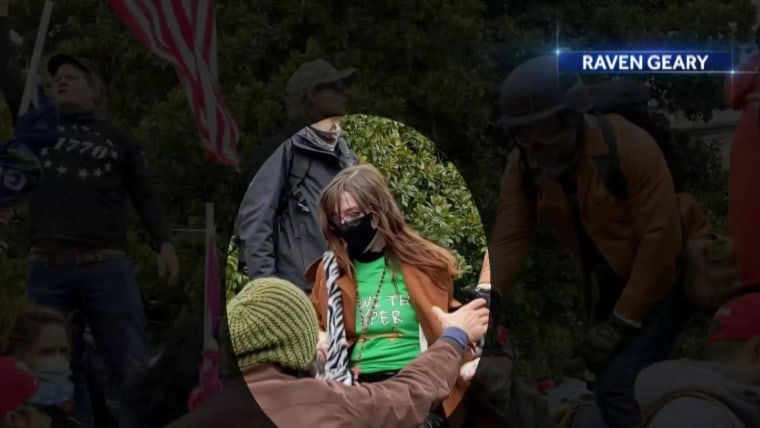WASHINGTON — A far-right extremist charged with aiding and abetting the theft of a laptop from Nancy Pelosi’s office during the Jan. 6 Capitol attack, “led an army” towards the House Speaker’s suite, prosecutors told jurors during closing arguments on Wednesday.
Riley Williams, a 23-year-old Pennsylvania woman arrested weeks after the Capitol attack, faces eight counts in connection with Jan. 6. Video features her encouraging rioters to take a laptop inside Pelosi’s office, and urging the mob to push up against officers inside the Capitol rotunda. Williams, both prosecutors and the defense agreed, was obsessed with Nick Fuentes and his group the “Groypers,” a far-right, white nationalist movement. Many of her more inflammatory posts haven’t been shown to the jury.
Given the extent of the evidence, most of the actions Williams took are not under dispute. Prosecutors said she spent 69 minutes inside the Capitol building, making her way through the crypt, into Pelosi’s office, into the Capitol rotunda, and eventually outside, where she climbed on a police vehicle. Williams traveled to D.C. with her dad but was separated from him before she entered the Capitol.
But the two sides differed in what her actions meant. To prosecutors, Williams was a leader who directed the mob. The defense portrayed Williams as a young woman who was “trying to be a somebody” on Jan. 6.
Williams was “calm, collected” and “focusing the power of this mob” inside the Capitol, Assistant U.S. Attorney Samuel Dalke told jurors, saying Williams led an “army” of rioters up the stairs and towards Pelosi’s office.
“The alarming part of what she did was how calm she was,” Dalke said. “She’s not paralyzed. She doesn’t hesitate. She takes charge of that mob.”
Lori Ulrich, Williams’ federal public defender, said that Williams might have “distasteful” beliefs, but came to D.C. “woefully unprepared” if she was truly hoping to stop the certification of the Electoral College votes, telling jurors Williams came to D.C. with her “cell phone and her fuzzy zebra bag.”
Ulrich reminded jurors that Williams sent a text and posted a video to social media stating that she was “STORMING THE WHITE HOUSE” when she was at the U.S. Capitol.
“That’s how turned around she was,” Ulrich said. “She initially thought she was entering the White House.”
Williams was “surprised to be where she was” in Pelosi’s office, Ulrich said.
Assistant U.S. Attorney Michael Gordon, on rebuttal, told jurors that Williams formed her intent when the opportunity arose.
“Generally speaking, this case is not a whodunit,” Gordon said. “The defendant has to concede everything she did because it’s on video.”
It doesn’t matter, he said, that Williams may have thought she was at the White House.
“When the opportunity to enter the Capitol arose, she took it,” he said.
Urich argued that Williams was bragging on Discord — the chat platform where she sent many messages that prosecutors argued were incriminating — and that much of what she said wasn’t actually true, it was just her fantasy world.
Try telling that to the Pelosi staffers who were huddled in a conference room in the speaker’s office suite, hoping the mob couldn’t break through, argued Gordon.
“Try telling them this was a fantasy,” Gordon said. “This was the defendant’s fantasy that she made a reality.”
Williams faces charges of obstructing, impeding, and interfering with law enforcement officers during civil disorder; obstructing an official proceeding; assaulting, resisting, opposing, impeding, intimidating, or interfering with law enforcement officers inside the Capitol building; stealing government property; and four misdemeanor charges faced by defendants who entered the Capitol.
Jurors will begin deliberating Williams’ case on Wednesday afternoon.
Source: | This article originally belongs to Nbcnews.com











